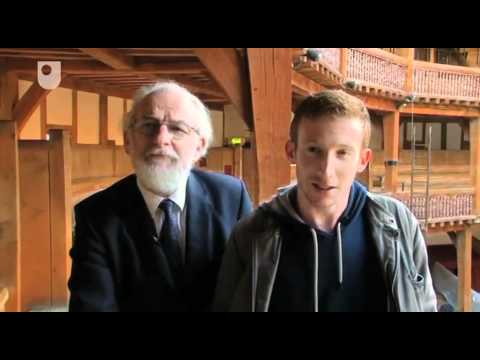I visited the Globe's Sam Wannamaker theatre on Sunday 20 July 2014 to see a scripted performance of Macbeth in the Globe's Read Not Dead series in the original pronunciation (OP) from the time of Shakespeare's play first being performed. Not having come across OP before that week I wasn't sure what to expect. I had also been to a presentation on OP earlier that week (see below).
I found the production of Macbeth interesting in many ways. OP is delivered much more quickly than modern English for a start, which gives less time to think about each line as it's delivered. It helps to already know the play!
The play was performed by a group under Ben Crystal, son of the expert on Shakespeare, David Crystal, who also performed in the play. I have used the Open University's photo of them here.
In the Q&A afterwards, one thing that interested me was one of the other two Shakespeare experts who came on for it, who was saying that by performing plays in OP certain things become apparent that were previously not so. In particular, in a previous production of Hamlet in OP it became apparent that the lines said by Queen Gertrude:
And let thine eye look like a friend on Denmark....were actually marking the end of a scene. This is because the ends of the scenes are marked by rhyming couplets in Hamlet. Presumably nobody had been aware that die and eternity (eternity rhymes with die) marked the end of the scene, although the players are kept on the stage by the dialogue that ensues. This obviously informs the way that the scene is played out.
Do not for ever with thy vailed lids
Seek for thy noble father in the dust:
Thou know'st 'tis common; all that lives must die,
Passing through nature to eternity.
It was interesting that the actors were saying that reading in OP de-intellectualises the play, meaning that it comes form the gut rather than the heart. I can understand what they mean by this but you have to hear it to get it.
One question asked was about accents and whether you can have a Warwickshire Shakespearean accent, a London one, etc. The answer was, in effect, that OP is not an accent but a framework around which actors can speak using their native accents. I got this completely when some of the actors were speaking naturally and I had picked up their natural accents from the way they delivered their OP lines. I can see that OP is not an accent at all but a way of pronouncing the words.
Ben was asked if the group is likely to take this production further. The answer was a very clear yes. I'm glad as this should be a proper staged production. I would willingly come again to that.
Something that David Crystal said was that you thought that everybody in the audience, from any part of the English-speaking world, would instantly recognise that in OP "they speak like us". I certainly recognised a few bits of West Riding in there, such as the pronunciation of words like 'take'.
So many of the rhymes work with OP, eg:
Third Witch: That will be ere the set of sun.Heath is pronounced more like 'heth', albeit slightly longer, which of course rhymes with 'Macbeth', In modern English you just have to ignore the possible rhyme.
First Witch: Where the place?
Second Witch: Upon the heath.
Third Witch: There to meet with Macbeth.
I couldn't decide always whether 'h's were being dropped consistently or randomly. A question was asked about this. David Crystal said that 'h's were pretty optional but were particularly used for emphasis.
Another interesting aspect was that the play was read from cue-scripts. These give the actors the three words before their lines along with their lines. The actors weren't allowed to discuss the way they were reading their lines with each other beforehand. This is consistent with the way that actors in Shakespeare's time would have had their lines and the Banquo actor explained how it affected the way they delivered (or mis-delivered) their lines.
Another interesting aspect I learned was the way actors lean on particular words differently in OP. The example given was the word 'leave', which is delivered in quite a mild way in modern English but in OP the actor can really stress it as it is pronounced as 'lev'.
One part of the production had two conversations taking place at the same time. This didn't work for me but I understand Ben Crystal's thinking, in that the conversations themselves are not important but he wanted the audience to get the effect of hearing different conversations depending where they were in the auditorium.
The consensus was that OP is the way forward in modern productions. Apparently 12 plays have been produced in OP (including A Midsummer Night's Dream at the Globe- I missed that one!). This means that 26 have not been OP'd yet. It will be interesting to see more!
Damn good value for money again!
17/7/14: Presentation on OP in sonnet and song
Three days earlier, on 17/7/14, I went to a presentation by Ben Crystal's group on OP in sonnets and song, which was fascinating. It was the first time David Crystal had heard OP in song, which was interesting.
There isn't too much more to say about this presentation that isn't covered above.

No comments:
Post a Comment